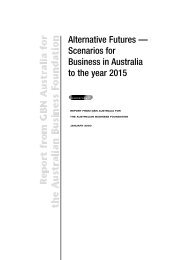Teaching for uncertain futures - Neville Freeman Agency
Teaching for uncertain futures - Neville Freeman Agency
Teaching for uncertain futures - Neville Freeman Agency
Create successful ePaper yourself
Turn your PDF publications into a flip-book with our unique Google optimized e-Paper software.
52LEARNING FROM THE FUTUREComing together as professionals regardless of schoolcontext, in joint professional learning or conversation,leads to shared knowledge and ideas, builds upprofessional identity and establishes a rich evidencebase to in<strong>for</strong>m policies <strong>for</strong> quality schooling. The voiceof the profession has an important contribution tomake in shaping education directions and practicesto meet future needs, whatever the future holds.Systems of communication and participation acrossthe profession will be challenges as they will be<strong>for</strong> other areas of society. Traditional approachesto professional association may be less relevant inthe future. The profession will need to explore arange of alternative approaches and mechanismsencouraging communication and participation as partof maintaining a strong profession and professionalidentity.Using scenariobuilding in schoolsFuturists and scenario planners contend thatalternative <strong>futures</strong> can be imagined. Engaging withthe future creates the capacity to anticipate it, raiseawareness about it, avert it and change it.This seems a fairly compelling reason <strong>for</strong> engagingin scenario building. While the predictive accuracyof scenario worlds may be of interest, that is not theirreal value. Scenario building does not enable plannersto ‘know’ the future. It will, however, help plannersopen their minds to other possibilities, to anticipateopportunities and threats and to plan accordingly.Scenario building helps planners shape the futurerather than just respond to it.Within the school context, scenario building can beused to stimulate discussion about the <strong>uncertain</strong>tyand unpredictability of change over the long termand about the nature and direction of change in theshorter term. Scenario building will assist teachers toconsider the future of learning and reflect on importantprofessional or local school issues. Exploration ofchanges in the broad school environment can throwlight on approaches to professional questions such as:What are the important elements of training <strong>for</strong>new teachers?What knowledge, skills and attributes are necessaryto be a highly effective teacher?How do schools best engage with parents and thelocal community?How can teachers’ skills and knowledge be keptup to date?What are the capabilities necessary <strong>for</strong> goodschool leadership?What contribution can teachers and principals maketo the development and renewal of the profession?Scenarios can help educators to consider theimplications <strong>for</strong> schools, teaching and the curriculumof globalisation and the internationalisation of thework<strong>for</strong>ce, the rapid growth of China’s and India’seconomies, the emergence of new technologies, andthe growth of knowledge about how the brainfunctions and how we learn.Future scenarios can assist teachers to set asideassumptions about what the role of a teacher is andwhat teaching and learning need to take place. Byexploring future possibilities and thinking about whatit will take to become a great school in the future,teachers can audit their planning and programs andrealign their activities to make them as consistent asthey can with their preferred <strong>futures</strong>. What teachingin the future will look like will be, to a large extent, aproduct of what teachers individually and collectivelydo in producing and implementing policies and of themoral compass that drives teachers’ work.



